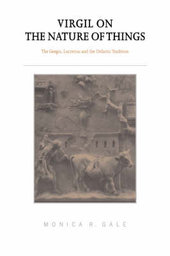
|
Virgil on the Nature of Things: The Georgics, Lucretius and the Didactic Tradition
Paperback / softback
Main Details
| Title |
Virgil on the Nature of Things: The Georgics, Lucretius and the Didactic Tradition
|
| Authors and Contributors |
By (author) Monica R. Gale
|
| Physical Properties |
| Format:Paperback / softback | | Pages:336 | | Dimensions(mm): Height 229,Width 152 |
|
| Category/Genre | Literary studies - classical, early and medieval |
|---|
| ISBN/Barcode |
9780521028967
|
| Classifications | Dewey:871.01 |
|---|
| Audience | | Professional & Vocational | | Tertiary Education (US: College) | |
|---|
| Illustrations |
Worked examples or Exercises
|
|
Publishing Details |
| Publisher |
Cambridge University Press
|
| Imprint |
Cambridge University Press
|
| Publication Date |
2 November 2006 |
| Publication Country |
United Kingdom
|
Description
The Georgics has for many years been a source of fierce controversy among scholars of Latin literature. Is the work optimistic or pessimistic, pro- or anti-Augustan? Should we read it as a eulogy or a bitter critique of Rome and her imperial ambitions? This book suggests that the ambiguity of the poem is the product of a complex and thorough-going engagement with earlier writers in the didactic tradition: Hesiod, Aratus and - above all - Lucretius. Drawing on both traditional, philological approaches to allusion, and modern theories of intertextuality, it shows how the world-views of the earlier poets are subjected to scrutiny and brought into conflict with each other. Detailed consideration of verbal parallels and of Lucretian themes, imagery and structural patterns in the Georgics forms the basis for a reading of Virgil's poem as an extended meditation on the relations between the individual and society, the gods and the natural environment.
Reviews'The book is characterized by thorough scholarship, discerning interpretation, and clear exposition. The success that she has achieved speaks both for her own energy and imagination, and for the abiding importance of the relationship between Virgil and his great predecessor.' Journal of Roman Studies
|